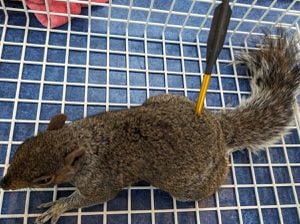Squirrel killed in crossbow attack as RSPCA reveals scale of animal abuse using weapons
Weapons have been used to target animals in the West Midlands on dozens of occasions in the past four years, the RSPCA has warned.

New data has revealed that lethal weapons including crossbows, air guns, catapults and slingshots are being used to deliberately target and kill wildlife and pets.
The animal charity has unveiled shocking new figures relating to deadly weapons used on animals over the past four years – with a horrifying crossbow attack on a squirrel in Kidderminster one of the most recent attacks.
The distressed squirrel was spotted in a garden in Whinchat Grove on June 19 by a member of the public who contacted the RSPCA to help the injured mammal.
RSPCA Inspector Steve Morrall rushed the squirrel to a vet where sadly he had to be put to sleep because of the severity of the injuries.
Steve said: “The squirrel was alive and in agony with the crossbow bolt lodged in his body. This cruel and intentional act caused the squirrel significant pain and unnecessary suffering.
“I’m also concerned that if someone is capable of this they may target other wildlife or even pets. There is also a real danger that a person could have got seriously injured as this is a residential area."
The RSPCA is appealing for information, with people asked to call its appeals line on 0300 123 8018.
Since the beginning of 2020 – up to to May this year – the RSPCA received 808 reports relating to animals being intentionally harmed with a weapon nationally.
There were 30 reports in the West Midlands.
Air guns and rifles were responsible for the bulk of the incidents, with 658 reports made to the charity; but weapons such as catapults and slingshots accounted for a combined 124 incidents while there were 34 calls to the RSPCA about crossbow incidents.
Many incidents reported to the charity involve more than one animal being targeted at a time.
The charity has released the heartbreaking figures as part of its Cancel Out Cruelty campaign, in a bid to raise funds to help its frontline rescue teams continue to save animals from cruelty and abuse.
RSPCA chief inspector for West Midlands, John Grant said: “It is unspeakably cruel, totally unacceptable and illegal to shoot animals for ‘fun’ – or as target practice, but sadly our emergency line is receiving hundreds of reports.
“We think of ourselves as a nation of animal lovers, but the RSPCA’s experience shows that there are people out there who are deliberately targeting wildlife, pets and farm animals with guns, catapults and crossbows. These weapons cause horrific pain and suffering.
“Day after day, our frontline officers and animal centres see the sickening consequences of weapons being used on animals – severe injuries often leading to death.
"And what we deal with is probably only the tip of the iceberg as not all cases will be reported to the RSPCA directly and there may be situations where animals injured and killed by these weapons are sadly never found – especially in the case of wildlife. This is why we need our supporters to back our Cancel Out Cruelty campaign so we can tackle this horrific trend.”
Because air guns feature in so many reports of intentional harm against animals, the RSPCA has been campaigning to remove the loophole from firearm legislation which allows minors unsupervised possession of air weapons on private land, describing it as a ‘recipe for disaster’.
The UK Government agreed with this proposal and in July 2022 undertook to amend the Firearms Rules 1998 to strengthen controls on access to airguns by minors, but this has yet to occur one year on.
All wild birds, including swans, are protected under the Wildlife and Countryside Act 1981 and it is an offence to intentionally kill, injure or take them except under licence. The maximum penalty, if found guilty, is six months in prison and/or an unlimited fine.
Anyone caught deliberately using an air gun to injure an animal can face up to five years in prison and/or an unlimited fine if found guilty under the Animal Welfare Act.
To help support the RSPCA, visit rspca.org.uk/cruelty





